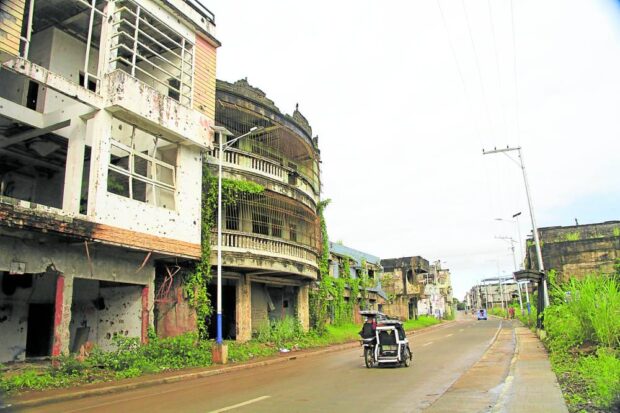Audit of Marawi rehab body sought
CONTRAST Damaged structures provide a stark contrast to the newly paved road, restored electricity lines and newly installed solar-powered street lights in Marawi City, in this May 2022 photo. —RICHEL V. UMEL
COTABATO CITY — The Marawi Reconstruction Conflict Watch (MRCW), an independent multisectoral group monitoring the rebuilding of the war-torn capital of Lanao del Sur, has asked Congress to probe the affairs of the Task Force Bangon Marawi (TFBM) to exact accountability before the body is dissolved by the end of March this year.
President Marcos, through Administrative Order No. 14 issued on Jan. 10, ordered TFBM abolished, with its tasks of coordinating recovery, reconstruction and rehabilitation of the city institutionalized in the functions of different national government agencies.
READ: Two paths for Marawi rehab
The abolition of the TFBM came as the President sought “streamlining of rehabilitation efforts.” The body’s operation had ceased by the end of 2023 and its mandate will be deemed to have expired by March 31 this year.
In its stead, peace and order will be handled by the Department of the Interior and Local Government; completion of transitory and permanent shelters by the Department of Human Settlements and Urban Development; restoration of public utilities by the Department of Public Works and Highways; delivery of health, sanitation, food aid and other basic needs by the Department Social Welfare and Development; and restoration of business and livelihood activities by the Department of Trade and Industry.
READ: Major housing projects not done yet by June 30 – execs
“This singular action gives us hope that the rehabilitation of our beloved city and its people will be served by duty bearers with a long-term mandate who will continue the work as long as needed,” the MRCW said in a statement.
“We hope that the institutionalization of Marawi’s reconstruction and rehabilitation effort will not be hampered by further delays, red tape and potential corruption,” the group added.
Transparency
“To avoid these pitfalls, it is important to begin the transition with an immediate, transparent, and forensic audit of all the funds and other financial and material resources that were poured into the rebuilding process,” the group further said.
TFBM is now on transition mode as the President’s order directed it to revert to the Office of the President the remaining balance of its trust fund, ensure proper accounting of all its assets and properties, settle outstanding obligations and submit a consolidated audited report of disbursements, among many others.
“Before dissolution, TFBM should be held accountable for the utilization of funds and implementation of projects. The audit should encourage third party involvement and public participation to ensure full accounting of critical events in the rebuilding process,” MRCW explained.
The group had asked Congress to investigate TFBM’s “utilization and management of the massive funds obtained by the Duterte [administration] from donors and aid agencies, both local and international.”
The government’s allocation of resources for Marawi’s rehabilitation from the five-month fighting between Islamic State-linked groups and government troops is based on a 2018 assessment that pegged the effort’s funding needs at P70 billion.
Budget share
A study done in 2021 by Zyza Nadine Suzara of the Institute for Leadership, Empowerment, and Democracy (iLEAD) showed that of the P70 billion needed for Marawi rehabilitation, only P17 billion was included in the national budget from 2018 to 2020, and as of the end of 2020, a total of P15 billion was released.
These were based on publicly available information from the Department of Budget and Management at that time.
In the 2021 budget, there was P5 billion allocated for Marawi reconstruction. The appropriation was under the National Disaster Risk Reduction and Management Fund, just like the allocations from 2018 to 2020.
Suzara’s research on the funds showed that some P28 billion of the resource needs was sourced through foreign loans, mostly from the World Bank and the Asian Development Bank, and some P998.7 million from China.
Another P9.5 billion is provided through foreign grants from the European Union, United States Agency for International Development, Australian government and United Nations agencies.
Formed in 2018, the MRCW is composed of families and clans affected by the 2017 conflict, which started when armed men led by the Maute Group laid siege to the city in May.















